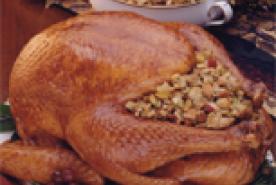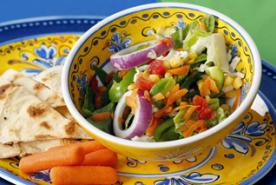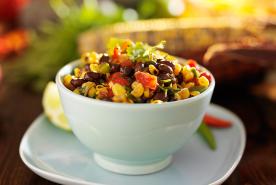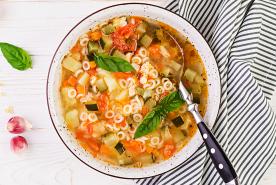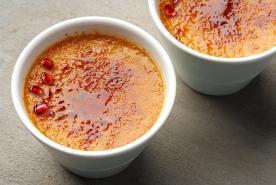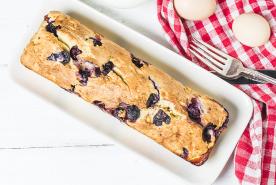Last updated: January 02, 2023
Medically reviewed by: NKF Patient Education Team
Fish is a high-protein, low-fat superfood rich in omega-3 fatty acids, vitamins, and minerals. Learn how fish benefits kidney health and find a tasty salmon recipe.
There are many varieties of fish. While all fish provide excellent high-quality protein for your diet, some fish provide higher amounts of omega-3 fatty acids. Our bodies do not produce omega-3 fatty acids, so we have to get them from our diet.
Why is fish a superfood?
Fish is a good source of protein without being high in saturated fat– Just a 3 oz portion of fish (the size of a deck of cards) provides an average of 20 grams of protein.
Other reasons why fish is considered a superfood include:
- Fish is loaded with vitamins such as D and B2 (riboflavin).
- Fish is a great source of minerals, calcium, phosphorus, iron, zinc, iodine, magnesium, and potassium.
- Fatty fish, such as salmon, are some of the best sources of omega-3 fatty acids. These omega 3-fatty acids are packed with benefits for your heart, brain, eyes, inflammation, and your overall health.
Fish and kidney disease
The amount of potassium and phosphorus in fish varies depending upon the type of fish (see the chart below). The amount of potassium and phosphorus you can have each day will depend on your stage of kidney disease and/or the type of dialysis you receive.
Chronic kidney disease (CKD) and transplant
Most people with kidney disease or transplants do not have to limit fish.
When you reach the later stages of kidney disease your doctor may want you to limit the amount of protein you eat. Eating fish can still be a great option but you might need to eat smaller portions. Talk to your doctor or to a kidney dietitian to find out your individual needs.
With a transplant, you will want to avoid raw or undercooked fish as it can pose an increased risk of foodborne illness (also known as food poisoning). Transplant patients are at higher risk since they take immunosuppressive medications or “anti-rejection medications” to protect the new transplanted kidney.
Hemodialysis (3 times a week) and daily home or nocturnal hemodialysis/peritoneal dialysis
People on dialysis have increased protein needs. Include fish two times per week as a great lean protein option and a way to help boost intake of omega-3 fatty acids. The potassium and phosphorus content of fish varies (see the chart below). Choose fresh fish when possible because it is lower in sodium. Canned fish can be high in sodium. Always talk to your kidney dietitian to find out how you can include fish in your diet.
Kidney stones
Eating fish will not have an effect on forming kidney stones.
Some concerns
Larger fish like tuna and sharks may have high mercury concentrations. See list of seafood, mercury levels and maximum serving recommendations per week at https://www.verified.org/articles/guides/mercury-poisoning-from-fish.
Cooked fish nutrition facts
| Food | Potassium mg/100gm (3.5oz) serving | Phosphorus mg/100gm (3.5oz) serving | Sodium mg/100gm (3.5oz) serving |
|---|---|---|---|
| Black cod/ Sablefish* | 459 | 215 | 72 |
| Bluefin tuna* | 323 | 326 | 50 |
| Catfish | 366 | 247 | 119 |
| Flounder | 197 | 309 | 363 |
| Haddock | 351 | 278 | 261 |
| Herring | 542 | 292 | 95 |
| Mackerel* | 558 | 318 | 203 |
| Perch | 344 | 257 | 79 |
| Pollock | 456 | 283 | 110 |
| Rainbow trout | 450 | 270 | 61 |
| Salmon* | 439 | 313 | 90 |
| Striped bass* | 328 | 254 | 88 |
| Sardines* (canned) | 397 | 490 | 307 |
| Tilapia | 380 | 204 | 56 |
| Tuna light (canned in water) | 176 | 137 | 219 |
| White fish | 434 | 285 | 132 |
*Good source of omega-3 fatty acids
Additional nutrition information can be found at the United States Department of Agriculture (USDA) website https://fdc.nal.usda.gov/fdc-app.html#/
Recipe
Baked salmon in foil
Servings – about 8 - 3oz servings
Ingredients
- ½ cup olive oil
- 2 ½ tablespoons lemon juice, or more to taste
- 5 cloves garlic, minced or pressed through a garlic press
- 1 tablespoon brown sugar
- 1 teaspoon dried oregano
- 1 teaspoon dried thyme
- freshly ground black pepper to taste
- aluminum foil
- 1 teaspoon olive oil
- 1 (2 pound) salmon fillet
- ¼ cup chopped fresh parsley
- 1 lemon, sliced
Directions
- Preheat the oven to 375°F (190°C).
- Combine 1/2 cup olive oil, lemon juice, garlic, brown sugar, oregano, thyme, and pepper in a bowl.
- Place a large piece of aluminum foil on a baking sheet and brush with olive oil. Place salmon in the middle of the foil, skin-side down. Drizzle with olive oil mixture. Fold up the edges of the foil over the salmon to create a packet, making sure to seal the edges.
- Bake in the preheated oven until the fish flakes easily with a fork, 20 to 25 minutes, until the internal temperature is 145°F. If your salmon fillet is very thick, it can take longer. Garnish with fresh parsley and lemon slices.
Nutrition facts per serving
| Calories | 285 |
| Fat | 22 g |
| Saturated fat | 4.5 g |
Polyunsaturated fat | 3.8 g |
| Monounsaturated fat | 13.6 g |
Cholesterol | 43 mg |
| Sodium | 44 mg |
| Total carbohydrate | 4 gm |
| Dietary fiber | 0 g |
| Total sugar | 2 g |
| Protein | 17 g |
| Potassium | 312 mg |
| Phosphorus | 250 mg |
Recipe adapted from https://www.allrecipes.com/recipe/263217/baked-salmon-in-foil/









